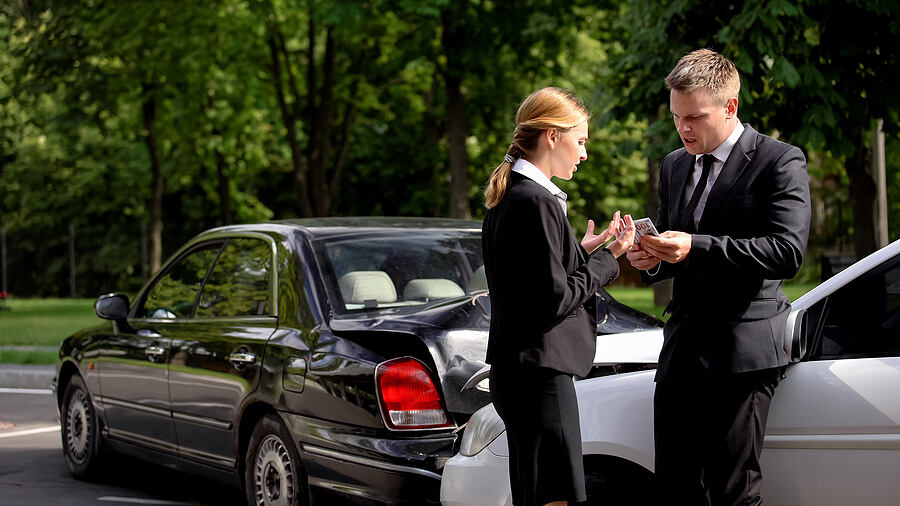
When you are in a car accident, you will probably notice a great deal of pain from the injuries you suffer and a lot of stress from getting back to normal. Before long, you will also notice bills piling up for medical expenses, vehicle repair costs, and various other inconveniences. You will also notice the toll that taking time off for recovery has had on your bank account.
When you notice such expenses piling up, you will probably start thinking about how much money you can get from a car accident settlement. If the accident was not your fault, you have the right to pursue compensation from the parties at fault. But how much can you get from a car accident settlement, and will it be enough? Those are the important questions we are here to help you answer before you start pursuing a settlement claim.
Who Can Seek a Car Accident Settlement?
In every state in America, private citizens may pursue redress for private wrongs committed against them, whether or not the at-fault party committed those acts on purpose. As a private citizen, you have the right to pursue compensation if another person caused you to lose time, money, and comfort because of their careless or wrongful actions.
After a car accident, all you have to do is show sufficient evidence that the other driver involved in the crash was the person at fault. If you can show this, you can recover compensation from that party (usually through their insurance company) to help you pay for the financial and personal losses you suffered.
Some states, including California, use a pure comparative fault standard. It holds each party responsible for the percentage of fault they contributed to the accident. So, if the other driver was 100 percent responsible, they could be responsible for paying 100 percent of what you suffered. Usually, the percentage of fault is decided by insurance adjusters on the case and/or the jury, if the case goes to court.
What Is the Process of Pursuing a Car Accident Settlement?
As with many legal matters, the process of pursuing a car accident settlement can be very long and complicated. However, every settlement negotiation follows a similar pattern. Your main responsibility is to find a good personal injury lawyer to help you pursue your claim. Once you have done that, your attorneys will help you with the rest of the process.
Here is how it usually works:
- Call a personal injury lawyer. The lawyer can give you a free consultation on how your case is expected to go and whether it is worth it for you to pursue legal action against the at-fault party (i.e., the defendant).
- Meet with the lawyer. After the initial consult, you will meet with the lawyer you called and discuss your case in more detail. There, they will help you determine how much your case could be worth and if you should commit to pursuing it. At that meeting, if you both want to work together, you will sign a contract. Usually, you will give your signature authorizing the lawyer to act as your legal representative to gather evidence.
- Gather evidence. Your lawyer, possibly with your help, will gather all evidence relevant to your claim. Usually, this includes medical bills and records, receipts for property damage, documentation of lost work and income, the police report, and witness statements. Lawyers may also seek medical experts to testify the severity of your injuries and the impact those injuries could have on your future.
- Send a demand letter. With help from your evidence, your lawyer will put together a demand letter to send to the defendant and their insurance company. This letter will detail how the accident happened, how it has affected your life, and why the defendant is responsible for providing you with compensation.
- Receive a response. Within 30 days, the defendant must respond to your demand. In this response, they will either accept your claim and make a settlement offer or reject your claim.
- Gather further evidence. Once a claim is in progress, your lawyers will gather more evidence. They will get any evidence that the defendant and their lawyer may have. They will also take interrogatories (written questionnaires) of involved parties or witnesses. Lawyers for both the defendant and the plaintiff (you) will take depositions (verbal questioning, much like what you would encounter in court) of the parties on the opposite side.
- Negotiate for a settlement. The lawyers in the case usually handle settlement negotiations. The defendant’s lawyer will send a settlement offer to your lawyer. Your lawyer will discuss the offer with you and help you decide if it is a fair offer or if you should continue negotiations and seek a higher settlement. Then, your lawyer will respond with your decision. This process continues until a compromise is reached.
- Take your case to court. If you and the defendant cannot settle agreeable to both parties, you may have to move your case to court. There, your lawyers will present evidence and argue your case in front of the judge and jury assigned to your claim.
- Receive a verdict. After hearing arguments on both sides, the jury will decide fault and how much of a settlement you can expect for your losses.
- Take your check. Your lawyers will help you process the check with your settlement earnings. At this point, they will take a percentage of your settlement for their services. You will receive the rest of the money to pay your bills and use as you see fit.
You should begin the settlement process as soon as you can. In most states, you will only have two years to commence an action against the defendant. Time goes by quickly when you are working to gather the evidence you need, so getting started as soon as possible is essential to making sure your case goes well.
How Much Can I Earn from a Car Accident Settlement?
The amount you will earn from your car accident settlement is likely to vary significantly based on the factors in your particular case.
For example, the amount you can earn depends on:
- The severity of your injuries.
- The long-term effects your injuries will have on your life.
- How much the defendant was at fault in the accident and how reckless their actions were (you may earn more if the defendant was drunk, for example, and endangering others on purpose).
When determining the exact amount of compensation you can recover, it’s helpful to look closely at all the damages you are eligible to earn.
In a typical car accident case, you can seek compensation for damages such as:
- Medical expenses for emergency room visits, surgeries, ongoing therapy, medication prescriptions, medical equipment, etc.
- Property damage repair expenses for repairs to your car, your phone, or other property damaged in the crash.
- The cost of lost income from taking time off of work to recover.
- The cost of future lost earning capacity if you cannot return to the same job in the same capacity because of your injuries.
- Pain and suffering in general.
- Emotional and mental distress or trauma such as PTSD.
- Loss of life enjoyment resulting from your inability to perform activities you used to enjoy.
- Loss of consortium if your relationships suffered because of your accident.
You and your lawyers will gather evidence of all these damages and determine an appropriate amount that should “cover” them. The process of calculating an exact amount is imprecise, so you should consider seeking legal help. Lawyers will know how to make a fair calculation based on your specific case and other similar cases they have seen in the past.
While there is no exact amount you can expect from a settlement, your lawyer will probably set a range for you from the least amount you should accept to the highest they believe you can receive. Negotiations will usually take place within this range.
What Do I Do After a Car Accident To Prepare for Settlement Negotiations?
As an injured party, the most important thing for you to do is focus on gathering the evidence that can help you win your case. Following a car accident, there are certain steps you should take to put yourself in a strong position for the pursuit of a claim.
Here is what to do right after an accident to help you get started on the right track.
- Immediately pull off the road and out of the way of oncoming traffic.
- Remain as calm as possible. Taking deep breaths and focusing on what steps to take next will help relieve some of the shock of the crash.
- Call an ambulance right away to assess any injuries. Get medical help for injuries and records of how the accident affected your health.
- Call the police. You will want an official police report of the accident to reference when it comes time to determine who is at fault and how the accident occurred.
- Talk to witnesses. If there were any witnesses to the accident, you should get their contact information and, if possible, ask them for a statement that you can keep with you. Your lawyers will need as many witness statements as possible to provide evidence of the defendant’s fault.
- Exchange insurance information with the other driver. Their insurance will likely be in charge of paying out the settlement amount you deserve.
- Take photos of the accident scene. Pay close attention to any damage or visible injuries and record them on camera for use as evidence.
- Call your insurance company. Regardless of who was at fault, you will still have to report your accident and may need your insurance company to help you cover initial expenses.
- Call a car accident lawyer. To get the most out of your case, you will want to find a good personal injury lawyer who can offer you the help you need to gather evidence and pursue negotiations with the defendant.
Do I Really Need a Lawyer to Get a Car Accident Settlement?
If you are like most car accident victims, you probably wonder if you really need help from a lawyer to get an appropriate settlement. You do need one to get the highest settlement possible. People who work with lawyers often get higher settlements than those who work alone. But there are other reasons to hire a lawyer as well.
After an accident, you are already facing a lot of stress. Not only are you recovering from a lot of painful injuries, but you are also having to deal with changing relationships, complicated work situations, and finding people to help you repair your damaged car and other property. Lawyers can help you find support as you go through these changes and relieve some of your stress.
In addition, lawyers know how to calculate the right settlement amount and deal with insurance companies that do not want to pay you what you deserve. Personal injury lawyers can take a tough stance and ensure that you get the compensation that is rightfully yours.
Do not take the first settlement the defendant’s insurance company offers you, and do not fight your case alone. After a car accident, reach out to a lawyer for a free consultation. They can help you get started on your case and reclaim the life you deserve so that you can heal and get back on track as soon as possible.







